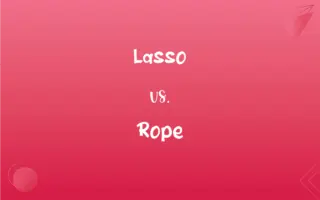Lollies vs. Lolly: What's the Difference?
By Harlon Moss || Updated on May 23, 2024
Lollies refer to various types of sweets or candies, often on sticks, common in British and Australian English, while lolly can mean a single piece of candy or be used as slang for money.

Key Differences
Lollies, commonly used in British and Australian English, denote a wide variety of sweets or candies. This term encompasses hard candies, gummy sweets, and especially those mounted on sticks, known as lollipops. Lolly, on the other hand, can refer to a single piece of candy or a lollipop. In British and Australian English, "lolly" might be used casually to mean one piece of candy from a collection of lollies.
Lollies are often found in stores and are popular among children and adults for their sweet flavors and variety. They are especially popular during holidays and celebrations, where assortments of lollies are commonly distributed. Lolly, when referring to a single candy, simplifies the idea to one item, which could be any type of sweet from the broader category of lollies. When used as slang for money, lolly represents a casual and informal way to talk about cash, typically in British and Australian contexts.
While lollies emphasize variety and are used to describe multiple sweets, lolly can narrow down to a single item or take on a completely different meaning related to money. The context of the conversation usually clarifies which meaning is intended, especially in regions where both usages are common.
Both terms illustrate the playful and colloquial nature of English in different regions, reflecting cultural preferences in language and sweets. Understanding the context is key to distinguishing between a tasty treat and a casual reference to cash.
Comparison Chart
Definition
Various types of sweets or candies
Single candy or slang for money
ADVERTISEMENT
Common Usage
British/Australian English
British/Australian English
Plural/Singular
Plural
Singular
Contexts
General term for sweets
Specific candy or money
Popularity
Common in celebrations and holidays
Common in casual speech
Lollies and Lolly Definitions
Lollies
Hard candies on sticks.
The children enjoyed different flavored lollies.
ADVERTISEMENT
Lolly
Single piece of candy.
She gave him a lolly as a treat.
Lollies
Various types of sweets.
She bought a bag full of lollies for the party.
Lolly
Slang for money.
He earned a lot of lolly from the job.
Lollies
Gummies and chewy sweets.
The store has a wide selection of lollies.
Lolly
Casual term for a piece of candy in the UK and Australia.
The lolly was delicious and fruity.
Lollies
Common term for candies in the UK and Australia.
He always has some lollies in his pocket.
Lolly
Lollipop.
The brightly colored lolly was a favorite.
Lollies
Assortment of small candies.
They handed out lollies during the parade.
Lolly
Sweet treat, singular form.
Can I have one more lolly, please?
Lollies
A piece of candy, especially hard candy.
Lolly
A piece of candy, especially hard candy.
Lollies
A lollipop.
Lolly
A lollipop.
Lollies
Money.
Lolly
Money.
Lollies
A type of undergarment worn by cheerleaders under their skirts in place of panties.
Lolly
A piece of hard candy on a stick; a lollipop.
Lolly
Money.
Lolly
Any confection made from sugar, or high in sugar content; a sweet, a piece of candy.
Lolly
(cricket) An easy catch.
Lolly
(archaic) A lump.
Lolly
(Canada) Snow or fine ice floating on water.
Lolly
Informal terms for money
Lolly
Ice cream or water ice on a small wooden stick;
In England a popsicle is called an ice lolly
FAQs
Are lollies always on sticks?
No, lollies can include hard candies, gummies, and other sweets, not just those on sticks.
What are lollies?
Lollies are various types of sweets or candies, often including lollipops, in British and Australian English.
Is lolly used in American English?
No, American English typically uses "candy" instead of lolly.
Is lolly a formal term?
No, lolly is informal and often used casually.
Do lollies refer to a specific type of candy?
No, lollies refer to a variety of candies, not just one type.
Where is the term lollies commonly used?
Lollies is commonly used in the UK, Australia, and New Zealand.
What is a lolly?
A lolly can refer to a single piece of candy or lollipop and is also slang for money in British and Australian English.
Can lolly mean money?
Yes, in British and Australian slang, lolly can mean money.
Do lollies include chocolates?
Generally, lollies refer to non-chocolate sweets, but usage can vary.
Can lolly be used to refer to any single candy?
Yes, lolly can refer to any single piece of candy.
Can you use lollies and candy interchangeably?
In British and Australian English, yes; in American English, candy is more common.
Can lolly mean the same as lollies?
In context, yes; lolly as a singular can refer to one of the lollies.
How do you use lolly in a sentence?
e.g., He saved up his lolly to buy a new game.
Is lolly commonly used in formal writing?
No, lolly is typically used in informal contexts.
Why is lolly slang for money?
The origin is unclear, but it's a playful and informal term.
Does lolly imply a specific candy form?
Lolly often implies a single candy or lollipop but can also mean money.
Is lolly more specific than lollies?
Yes, lolly usually refers to one item, whereas lollies refer to multiple candies.
What regions use lolly to mean money?
The UK and Australia use lolly as slang for money.
How do Australians refer to sweets?
Australians often call sweets "lollies."
Are lollies a popular treat?
Yes, lollies are popular, especially among children and during holidays.
About Author
Written by
Harlon MossHarlon is a seasoned quality moderator and accomplished content writer for Difference Wiki. An alumnus of the prestigious University of California, he earned his degree in Computer Science. Leveraging his academic background, Harlon brings a meticulous and informed perspective to his work, ensuring content accuracy and excellence.































































